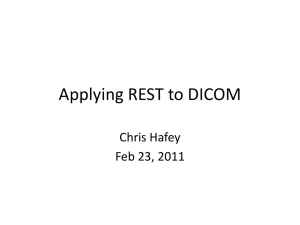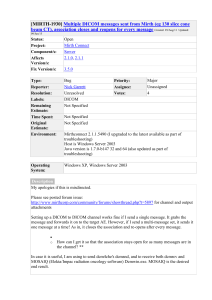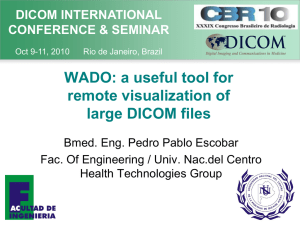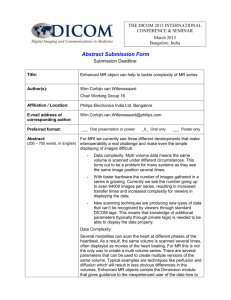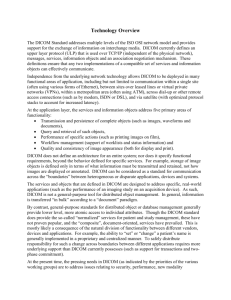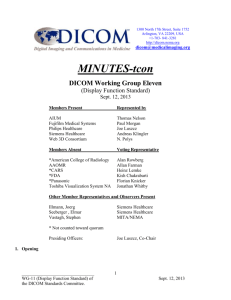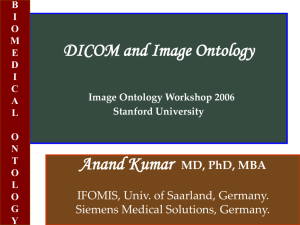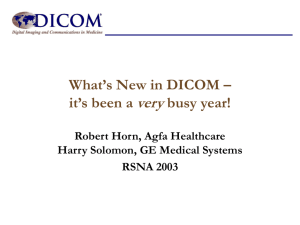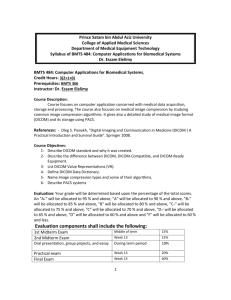patient
advertisement
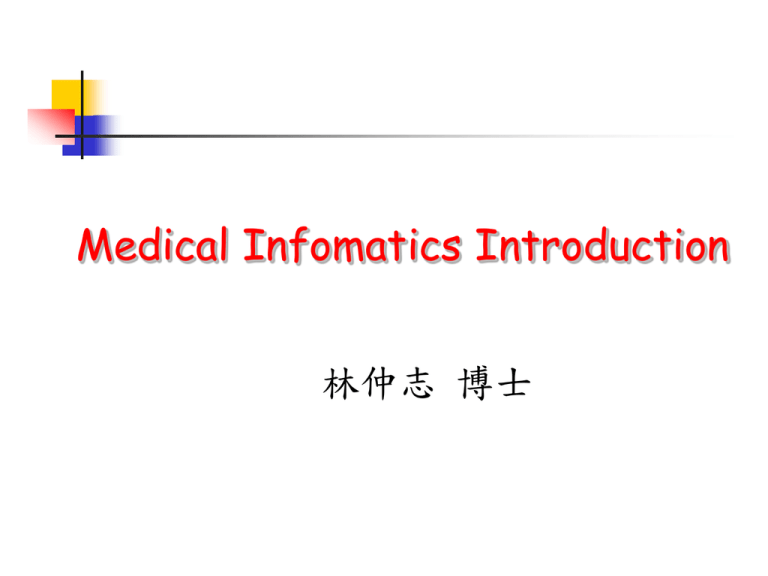
Medical Infomatics Introduction 林仲志 博士 Medical Information MI can’t and should not replace thought processes in human brain but should amplify the brain’s capabilities The objective and scientifically based part of the diagnosis may be left to the computer. Those elements of the individual problems of patient can’t be handled over a machine Diagnostic – therapeutic cycle observation Information Data patient Therapy Source handbook of Medical Informatics decision plan Diagnosis Data in computer Medical data elements The patient in question The parameter being observed Liver size, History, PE, Images, Bio-signal The value of parameter in question The time of the observation What are the types of medical data Narrative data Numeric data ECG, EEG Visual images Blood pressure, weight, temperature Analog data Chief complain X ray, CT, MR Hand-draw sketches The history of Patient Record Time - Oriented Medical Record Source – Oriented Medical Record Mar 4,2003 : Shortness of breath….. Mar 4, 2003 : Visit Mar 4, 2003 : Lab, X-ray…. Problem –Oriented Medical Record S (Subjective) O (Objective) A (Assessment) P (Plan) The issue of patient monitory data Data Quality and Validation Continuous versus intermittent Monitory Data Recording frequency Integration of multiple kinds of data The history of MI architecture 1960 - 1970 Central Systems 1970 - 1980 Modular Systems 1980 - 1990 Client / Server Systems 1990 - now Web-based Systems The basic element of MI system Standard Database LAN,WAN Wireless Communication Viewing Station Relational DB Object-Oriented DB Network Data Coding Input Device Processing Units Output Monitor Storage HD,DVD,Tape How to use medical data Create the basis for the history record Support communication among providers Anticipate future health problems Evidence : problem, symptom, examination, treatment Screen high risk factor Record standard preventive record Identify deviations from expected trend Provide a legal record Support clinical research Cost management Level of complexity of MI Human-based Research and development Therapy and control Diagnosis and decision making complexity Processing and automation Storage and retrieval Computer-based Acquisition and Communication MI Trend Research Formulate rules Discover laws Structure model Application Control and stabilize the cost of health care Shift from hospital care to primary (home) care Shared care Electronic data interchange Telemedicine Understand DICOM 數位式病歷系統 掛號 用藥 影像 財務 病人資料 HL7 Integration Interface 健保法規 DICOM 診間報告 XML Disk CD-ROM 開業醫 A TCP/IP 開業醫B Web 開業醫C Digital Imaging and Communications in Medicine (DICOM) Why DICOM? DICOM Standard Image File Format Object Tag Raw Data of Image Exchange Information Protocol OSI、TCP/IP Information Object Services Class DICOM Part 1: Introduction and Overview DICOM Part 2: Conformance DICOM Part 3: Information Object Definitions DICOM Part 4: Service Class Specifications DICOM Part 5: Data Structure and Semantics DICOM Part 6: Data Dictionary DICOM Part 7: Message Exchange DICOM Part 8: Network Communication Support for Message Exchange DICOM Part 10: Media Storage and File Format for Media Interchange DICOM Part 11: Media Storage Application Profiles DICOM Part 12: Media Formats and Physical Media for Media Interchange DICOM Part 13: Print Management Point-to-Point Communication Support DICOM Part 14: Grayscale Standard Display Function DICOM Part 15: Security Profiles Comparing DICOM conformance statements Check and compare the application descriptions Match up the DICOM service object pairs Match up the User/Provider roles Check the number of simultaneous associations Compare the presentation contexts Compare the communication profiles Check for any special object attribute requirements Application Entities and bubble diagrams Img Acq. Remote Storage SCU/SCP DBMS Processing Modality Worklist SCP Application Entity Query Retrieve SCU/SCP Xfer Image Modality PACS Interface Verification SCU/SCP DICOM Service Composite DICOM C_Store DICOM C_Find DICOM C_Move DICOM C_Get DICOM C_Echo Normalized DICOM N_Action DICOM N_Eventrep DICOM N_Create/Set DICOM N_Delete DICOM C_Store Requirement The modality shall send images for soft copy display Modality Push DICOM C_Store CT / MR DICOM C_Store Requirement Old images shall be available to the technologist at the modality console when comparing study PACS Push DICOM C_Store CT / MR DICOM C_Find /C_Move Requirement : modality query the PACS to get patient’s images Modality : SCU of Query/Retrieve Service Modality Pull DICOM C_Find CT / MR DICOM C_Move DICOM C_Find /C_Move Requirement : PACS get additional studies, series, images Modality : SCP of Query/Retrieve Service PACS : SCU of Query/Retrieve Service PACS Pull DICOM C_Find CT / MR DICOM C_Move Match up the DICOM service object pairs Service Object Pairs : SOP SOP Class SOP Instances The functionality of a device The identifying the individual object SOP Class like as template Match up the DICOM service object pairs SOP Class Service element Object define Store, Find, Move, … CT Image SOP is identified with a Unique Identifier (UID) UID Examples – Storage Service SOP Class Name SOP Class UID Computed Radiology Image Storage 1.2.840.10008.5.1.4.1.1.1 CT Image Storage 1.2.840.10008.5.1.4.1.1.2 MR Image Storage 1.2.840.10008.5.1.4.1.1.4 Nuclear Medicine Image Storage (Retired) 1.2.840.10008.5.1.4.1.1.5 Nuclear Medicine Image Storage 1.2.840.10008.5.1.4.1.1.20 Ultrasound Image Storage (Retired) 1.2.840.10008.5.1.4.1.1.6 Ultrasound Image Storage 1.2.840.10008.5.1.4.1.1.6.1 Match up the User/Provider roles DICOM is based on two way communication A device that sends, the other one that receives DICOM terminology : Invokes, Performs DICOM roles SCU (Service Class User) SCP (Service Class Provide) SCU/SCP Example Scenario MRI, radiology workstation, physician workstation, Printer server MRI send image to workstation Radiology receive image from MRI, send image to physician for consultation, send image to printer for printer service Physician query old image, view image, Printer Service SCU/SCP Role MRI : SCU of the storage SOP Class Radiology : SCU/SCP of the storage SOP class SCP of the query service SCU of the printer service SCU/SCP Role Physician SCP of the storage SOP class SCU of the query service Printer SCP of the printer service Check the number of simultaneous associations How many “DICOM Conversations” can handle simultaneous? Purpose: SCP : a separate device is required Can handle the potential impact on performance How long does an association stay open? Compare the presentation contexts Also called :Transfer syntax Not all PC use the same byte ordering How the information is encoded for each SOP class Ex. Implicit / Explicit VR, Little/ Big Endian JPEG compression Implicit / Explicit VR DICOM part 5:define Value Representation (VR) DICOM part 6 (Dictionary): attributes Data Elem. Tag Data Elem. Data Elem. VR Value Length Data DIOCM Data Element Tag : 16 bit unsigned integer representing the Group Number and Element Number Ex. (0008,0020) Study date (0008,0060) Modality (0010,0010) Patient’s name (0010,0020) Patient ID (0028,0010) Number of pixel rows in the image (0038,001A) Scheduled admission date Value Representation : two-byte character string containing a code which describes the data type for that element Value length : an unsigned integer which give the length of value field in bytes Value filed : this is the actual value being sent. The value field must always contain an even number of bytes. Little / Big Endian Little : the Least Significant Byte come first Big : the most Significant Byte come first Data compression Require reason Reduce storage space, certain application, WAN Trade – off using image compression Compare the communication profiles DICOM follow OSI-7 layer communication model. There are three communication options OSI 50 pin point-to-point TCP/IP ->Transport Layer Physical connection is not define OSI 通訊協定七層架構 應用 Application 展現 Presentation 會議 Session 運輸 Transport 網路 Network 資料鏈結層 Data Link 實體層 Physical Check for any special object attribute Check for additional and/or unusual attribute requirements Attribute The smallest component of DICOM Object Ex. : Patient Name Failure to properly match attributes can break a system Picture Archiving and Communication System PACS 目前健保申報模式 健保局在抽審時會要求診所將病人病歷以及在 該次治療時所拍攝之片子全部送至健保局備審, 待健保局審完之後再將影像連同複印的病歷寄 回診所 缺點 往返時間過長 影像送審後診所沒有留存,因此健保局像若是沒將 影像送回診所將無法調閱該影像 影像在寄送時容易發生遺失的情形,沒有備份影像 可以調閱。健保局會因此無法審查 傳統片子缺點 一般診所並無此翻拍設備進行 資料備份 需沖洗,環保問題 保存不易 調閱不易 無法資源共享 數位化影像特色 便於資料的儲存與管理 可用電腦輔助分析軟體來提升醫療品質 可透過網路傳輸提供會診達到資源分享 減低人工作業,增進調閱速度 Main Component of PACS Archiving Server Application Client Network Storage Database Printer Main Component of PACS Archiving Server Image Import/Export Image Information Management Image Data Backup/Restore Image Data Flow Control Error Message Control Main Component of PACS Application Client Image Display Image Process Image Report Template Storage DICOMDIR DATABASE Main Component of PACS Network Internet Analog Modem, ADSL ISDN, Cable ATM Intranet Giga Bit Fast Ethernet FDDI Main Component of PACS Storage Huge Capacity Hard Disk Disk Array(Mirror, RAID5) Juke Boxes:MO、Tape、DVD、CD-RW、 CR-R How to implement ? Working Model Data exchange System upgrade Standard Easy migration Cost Time Network Bandwidth Protocol 台大遠距醫療系統 金山衛生所 Chinshan NTUH NTUH medical center The information center of NTUH Telediagnosis room(II) in NTUH The site of joined telemedicine project Chinshan health care center Dermatology CCD Disk array Main database CD-ROM Long-term database MPEG Encoder Film digitizer Acquisition station A viewing station with Local database and dual monitors Ethernet Network Teleconsultation room(I) in NTUH Teleconsultation room(III) in NTUH Hub Ultrasound Hub Document camera A viewing station with Local database and dual monitors DSU/CSU PC-based viewing station Teleconferencing Teleconferencing ATM (DS1) DSU/CSU ISDN Teleconferencing The site of joined telemedicine project: Veterans General Hospital The site of joined telemedicine project: The site of joined telemedicine project: Buddhist Tzu Ghi General Hospital National Chung-Kung University Hospital 雙螢幕會診系統 遠距X片會診 超音波診斷 Chinshan Health Care Center NTUH Thank you for your attention
